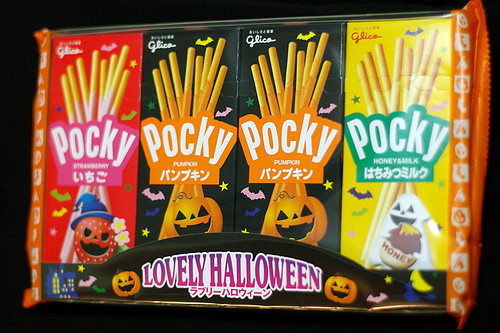Since fall's approach I've started to think a lot about American seasonal and holiday traditions and their contrast with Japan's.
I've lived abroad twice before, in France and Nagasaki, but both were during the summer, only one season long. This is my first autumn and winter away from the U.S. of A. As I experience autumn here, I realize that it takes being separated from your home culture to be able to see it with a more objective eye. Only by being apart from something can you realize what you take for granted. Japan observes the Western holidays of Halloween and Christmas, but because these holidays lack history here, the extent and type of celebration can be very different. For example, this is the Halloween I love from the states:
And this is Halloween in Japan:
As cute as it is, that's not the Halloween I know. The cultural tradition and meaning behind the holiday isn't there. Yes, Halloween is now essentially a for-fun holiday in the states, but because we've been celebrating it for hundreds of years, it has manifested itself in deep ways in our culture. In Japan it's just another vacuous Western import.
Christmas is worse. Christmas isn't about family...it's a date night! Come December, I will feel the pangs of longing for singing winter choral music, decorating the Christmas tree with mama, lights on the trees everywhere, and exchanging gifts and cards with friends. It's such a big part of me, I can almost tear up just thinking about it.
But, experiencing all this nostalgia and yearning for the culture I know and love makes me happy, because it makes me realize that pride and warmth actually exist in me. I could spend forever bashing my country's policies, government, educational system, etc, but of course there is a part of me that feels at home being American and doing these American things. Oh wait...I actually like Halloween and look forward to it! I hadn't realized. This so-called "Western tradition" is my home, my comfort zone, as it is for all who grew up with it. By being apart from my comfort zone, I can better conceptualize that where one grows up determines their center vs. periphery, their comfort zone vs. unknown.
When I go to a matsuri, or when I read about the traditions of Sho-gatsu or Setsubun, I try to understand the the associations that Japanese people have with their holidays. Japan has a literal wealth of holidays and traditions which are much, much older than anything ever made in America. I'm very excited to experience them.
I am in Japan. I want to observe Japanese cultural tradition for what it is, and not get caught up in what I'm missing out on back home....but it makes me happy to realize that I do miss it. :)
Tuesday, October 30, 2012
Sunday, October 21, 2012
Phase Two
The stages of culture shock.
(Which, by the way, is a misnomer: we don't feel "shock" in the sense that we're surprised or baffled; "Cultural Fatigue" or "Cultural Adjustment" are better names.)
Obviously the chart is simple and depends on so many other factors, but no matter what, there are bound to be those occasional moments where you feel discontentment or hostility for your host culture. In the JET world, we call it "stage-twoing." After having ridden the honeymoon wave of culture explosion, you settle in to a second stage in which you're more prone to homesickness or frustration. In our schedule, this just happens to coincide with the onset of colder weather, which for me means lethargy and laze.
My outlook hasn't changed, and neither have my circumstances per se. But the combination of approaching the 3-month mark, the arrival of the cold autumn winds, and the onset of unexpected health issues has lately given me less reason to celebrate and more reason to stew.
From afar, it must look like my life is simple and great. That's how others' lives looked to me when I saw their pictures of life in Japan. That's because pictures string together a simple story of a simple life. They're each a square on a patchwork quilt called My Life, but they're only the cover, the surface. My life feels so much more complicated than my collections of pictures can reveal.
But, it's all a reminder to me of the quote I have written on my wall. The agent of change is you. You guide your own life. You guide your actions and your attitudes. And it is your attitude which determines everything.
I'm very lucky that I have a workplace which supports me. I don't know where I'd be if it weren't for my kind 校長先生 (principal) and JTE (Japanese Teacher of English.) I'm very lucky I have a network of friends and acquaintances, those who can empathize with me and help me, throughout Gunma and beyond. I'm very lucky to BE HERE. NOW. Securely employed doing something I'm passionate about. Learning a culture and a language. Yes, I need other facets of my life in order for it to feel complete, but they're all second fiddle to those two things.
So I choose to be content.
Thursday, October 11, 2012
直島
Despite a froggy voice and perhaps The World's Worst Cold, Naoshima, Japan's Art Island, was a beautiful dream. I was blessed to experience this tranquil island of rich culture, beautiful art and even more beautiful weather.
Monday, October 1, 2012
2-Month-Mark: A Check-Up.
Cross-hatched concrete riverbanks are normal.
Streets too narrow to go both ways are the status quo.
Spiders as big as my palm don't faze me.
Food is something else.I can't quite claim washoku (Japanese food) as a comfort food. I'm continually underwhelmed by kyuushoku (school lunch.) I try to eat Japanese food most of the time, but I'm a greasy American and Japanese food isn't bread-y or fatty or sweet enough for my disgusting westerner tastes. So, although the Japanese foods are among the cheapest and healthiest you can buy at the grocery store, I still ring up cereal and ice cream and fruits and loaves of bread and pasta. On rainy nights like these, I just don't want miso soup, I want CARBS and lots of them.
A picture from one of my walks. From Hokkitsu looking over into Shimogo on a stormy dusk.
My daily-ish ritual of taking evening walks is a beautiful one indeed. My town is still novel to me so there's almost nowhere I can walk that I find uninteresting. I branch out in every direction from my home and almost always find somewhere new to explore. There's still about an hour of daylight left after I leave work and I intend to use it.
It makes me brim with pride to see my students take Sports Day so seriously. They truly all give it their all and support their team to the end. Team Yellow got first place. I think if I had been given this opportunity (i.e. coerced into athletic participation) as a child, I wouldn't be so abhorrent to sports and exercise as I am now.
Watching my student cry while making a speech to his classmates during Sports Day fueled the fire in me to be there for my students as much as circumstances allow. These kids are so honest and pure and hard-working. There is not a single one who doesn't take his or her education seriously, no one who doesn't work hard every day, not a single one who disrespects a teacher. And yet, they don't value their own individuality, they downplay their strengths, and hesitate to answer even the simplest of questions because they fear risk. The vast contrast between American students and these students strikes me every day. The love that I have for them developed quickly, and it frustrates me that the language and culture barrier impedes my getting to know them. I need to affirm my presence and my goals every day. I feel positive about my place at work and my ability to influence my students. I feel inspired and I have a whole nestload of ideas in my sleeves. However, change is very slow, and I must be patient. I remind myself daily that as Rome wasn't built in a day, neither can I so quickly build a program at this school. Gradually, my influence at my tiny school will grow, and my relationships with students will deepen. I will worm my way in and make English the big thing here, as well as showing them that I care deeply about their development as individuals.
In this morning's school assembly, each class grade (in groups of 15-20) stood up and presented a short speech, about 2 minutes long, completely in unison. All voices speaking together, with nary a consonant out of place, for two minutes. The robotic, metallic-tinged mélange of voice timbres and ranges sounded like the devil himself speaking through these students. After the assembly, my Japanese Teacher of English told me that next time, students will recite English sentences. I asked her "what is the educational goal of having students memorize speeches to speak in unison? Why do you have them do this?" To my awe, she paused to think for a moment, cocked her head to the side, sucked in air through her teeth, and walked away to talk to another teacher before I could reiterate my question. There are some things I don't understand about Japanese education, and cultural manners, which I probably never get used to. But it's not worse, just different. Not worse just different not worse just different not worse just different.
All this and it's only been two months. Let's imagine where the next two months will take me...and the two after that, and the two after that, and the two after that.
Streets too narrow to go both ways are the status quo.
Spiders as big as my palm don't faze me.
Food is something else.I can't quite claim washoku (Japanese food) as a comfort food. I'm continually underwhelmed by kyuushoku (school lunch.) I try to eat Japanese food most of the time, but I'm a greasy American and Japanese food isn't bread-y or fatty or sweet enough for my disgusting westerner tastes. So, although the Japanese foods are among the cheapest and healthiest you can buy at the grocery store, I still ring up cereal and ice cream and fruits and loaves of bread and pasta. On rainy nights like these, I just don't want miso soup, I want CARBS and lots of them.
A picture from one of my walks. From Hokkitsu looking over into Shimogo on a stormy dusk.
My daily-ish ritual of taking evening walks is a beautiful one indeed. My town is still novel to me so there's almost nowhere I can walk that I find uninteresting. I branch out in every direction from my home and almost always find somewhere new to explore. There's still about an hour of daylight left after I leave work and I intend to use it.
It makes me brim with pride to see my students take Sports Day so seriously. They truly all give it their all and support their team to the end. Team Yellow got first place. I think if I had been given this opportunity (i.e. coerced into athletic participation) as a child, I wouldn't be so abhorrent to sports and exercise as I am now.
Watching my student cry while making a speech to his classmates during Sports Day fueled the fire in me to be there for my students as much as circumstances allow. These kids are so honest and pure and hard-working. There is not a single one who doesn't take his or her education seriously, no one who doesn't work hard every day, not a single one who disrespects a teacher. And yet, they don't value their own individuality, they downplay their strengths, and hesitate to answer even the simplest of questions because they fear risk. The vast contrast between American students and these students strikes me every day. The love that I have for them developed quickly, and it frustrates me that the language and culture barrier impedes my getting to know them. I need to affirm my presence and my goals every day. I feel positive about my place at work and my ability to influence my students. I feel inspired and I have a whole nestload of ideas in my sleeves. However, change is very slow, and I must be patient. I remind myself daily that as Rome wasn't built in a day, neither can I so quickly build a program at this school. Gradually, my influence at my tiny school will grow, and my relationships with students will deepen. I will worm my way in and make English the big thing here, as well as showing them that I care deeply about their development as individuals.
In this morning's school assembly, each class grade (in groups of 15-20) stood up and presented a short speech, about 2 minutes long, completely in unison. All voices speaking together, with nary a consonant out of place, for two minutes. The robotic, metallic-tinged mélange of voice timbres and ranges sounded like the devil himself speaking through these students. After the assembly, my Japanese Teacher of English told me that next time, students will recite English sentences. I asked her "what is the educational goal of having students memorize speeches to speak in unison? Why do you have them do this?" To my awe, she paused to think for a moment, cocked her head to the side, sucked in air through her teeth, and walked away to talk to another teacher before I could reiterate my question. There are some things I don't understand about Japanese education, and cultural manners, which I probably never get used to. But it's not worse, just different. Not worse just different not worse just different not worse just different.
All this and it's only been two months. Let's imagine where the next two months will take me...and the two after that, and the two after that, and the two after that.
Subscribe to:
Posts (Atom)















